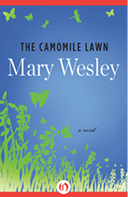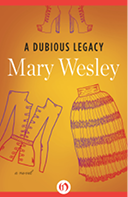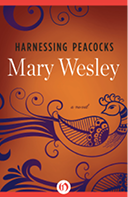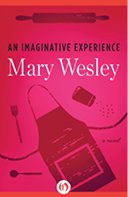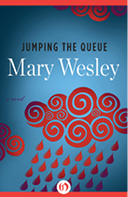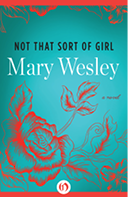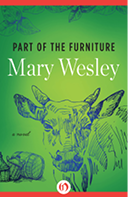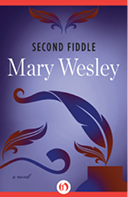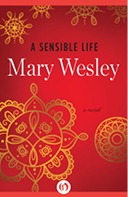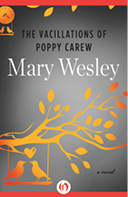Imaginative Experience (26 page)
Read Imaginative Experience Online
Authors: Mary Wesley

Where the hell was she? She was taking a helluva long time over a pee. She had taken the dog with her. Had she scarpered? Christ Almighty!
She had taken her coat when she left the table. He had heard departing customers start up their cars; she could have cadged a lift, done a runner? Oh, dear God! And all through the meal I burbled on about myself, my boring ineffectual life, when I should have been enchanting her with fascinating plans for our future. Oh God, what a fool! I should have found out whether she’s been to Venice. Would she prefer to explore Italy or France, or rather go to Peru? Has she seen the Alhambra? Would she prefer the West Indies or Japan? Will she be happy living in my house? Perhaps a cottage in the country? Is she keen on clothes? I’ve never seen her in anything but that black overcoat and jeans. I don’t even know what her legs are like, didn’t dare look that night. I’d love to buy her clothes. I’d love to give her things, have her always there to share jokes; and babies, would we dare? ‘Oh, dear God!’ he said out loud. ‘And now she’s gone.’
‘Sorry to be so long,’ Julia said, reappearing. ‘The wretch did something he has not done before; he shot off after a cat, disappeared right down the street, didn’t come when I whistled.’
‘I thought you’d hopped it.’ Sylvester helped her into her coat. ‘I thought I had bored you into running away.’
In the street the air crackled with frost. Julia turned up her collar; they got into the car. ‘I was not bored,’ she said.
Driving along the twisting lanes, Sylvester said, ‘I talked too much, I apologize. You could not have got a word in edgeways.’
She said, ‘I am not used to talking, though I sometimes can with Mrs Patel.’
‘Does she understand?’
‘Not a lot, but it’s good. We laugh a lot.’
‘No-one else?’
‘A girl from the bottom flat tried to be friendly, but I frightened her. She thought I was plotting to kill myself—this was when they were killed, just after the funeral. Her overture went wrong, she drank all my vodka and I helped her to bed.’
‘Not a social success.’
‘I could not talk, but longed to. D’you know that state?’
‘I do indeed.’ I am in it now, Sylvester thought.
‘I sheltered from the rain in a church. There was a priest who was kind, terribly kind but I could not tell him the real snag, the real worry.’
The road led them up a hill through a beech wood, the boles of the trees stark in the moonlight. Sylvester said, ‘Apropos of nothing, have you thrown away that toy?’
‘Oh no! It’s not the original, it’s not Christy’s. Of course I keep it. I did not throw his lamb out. When he was killed, and Giles, I gathered up everything, toys, clothes, books, everything of theirs and got rid of them. I could not bear having them around me. Christy’s lamb was with him in the smash. You probably felt the same about Celia’s things? Dumb reminders.’
‘Not exactly. She took everything except the terrible cupid in the garden. I threw that out.’ He was glad she had kept the toy.
Julia said, ‘What you need for your garden is an eighteenth-century lead shell for a bird bath.’
Sylvester said, ‘Will you help me find one?’ Then, ‘Suppose we leave the car here and give Joyful his walk?’ We leap from subject to subject, he thought, we shrink from vital issues.
They left the car and, climbing up through a belt of trees, dead leaves crunching underfoot, reached open downland.
Julia said, ‘When my parents split up I was younger than Christy. My father kidnapped me. I remember a wood like this, holding his hand—reaching up.’ A few paces on she said, ‘He sent me back in a car with strangers, a man and a woman. It was only a gesture.’
There was a sudden rustling on the edge of the wood and the dog set off in pursuit of a hare. They watched his diminishing shape and listened to his muffled yelps.
Sylvester said, ‘Your m—Clodagh must have been immensely relieved to get you back.’
‘I don’t know about that,’ Julia said crisply. ‘Clodagh is not the maternal type; children are toys, possessions. What Clodagh likes is a young lover whom she thinks she can manipulate, but who in fact manipulates her. Oh!’ she said. ‘The hare got away, he is coming back.’
Sylvester took her hand and putting it in his pocket held it there, keeping it warm. ‘Go on.’
Julia said, ‘I was a mug. I did not know she and Giles were lovers. I was puzzled by her attitude when I found myself pregnant after he had raped me. I was all for an abortion, to get away, to forget the whole thing; her leg was OK by then. But she insisted we marry. I was obtuse, plain bloody stupid, blind, but she wore me down. So I thought, OK, I’d try and make a go of it, Giles could be quite decent, could be, had been attractive and funny. He could laugh. We had laughed together, he made silly jokes about Clodagh—they seemed funny at the time, anyway—so we married, as she insisted. Am I boring you?’
‘No. Go on.’ They had left the trees and were walking across downland. In the distance there was a stand of trees; everything was very clear by the light of the moon, which cast deep shadows into the valley. It was so quiet Joyful’s panting sounded loud, his breath clouding in the freezing air. ‘Go on,’ Sylvester said.
She took a deep breath. ‘We had this lovely honeymoon in Paris. It turned into a nightmare. He compared me with Clodagh I suppose, I suppose he felt trapped.’
‘And?’
‘Oh, violence, drink, broken glass, all that. And hurtful words, which are so much worse.’
‘And you?’
‘Trapped, too.’
‘Go on.’
‘We came back to London to the flat. He came and went. Christy was born. I started work again. Had to. Time passed, as it does. I tried, not hard enough obviously, and little things add up—’
‘Such as?’
‘He smelled. It’s humiliating to recall. Pits, breath, feet. When he drank, he did not wash. I shrank from him, couldn’t bring myself to do enough to make the marriage work. It did not really exist except on paper, it never had.’
‘But Christy?’
‘He existed. I loved him. But then, my God! So did she in her way.’
‘Go on.’
‘That’s what I could not do, go on. I divorced him. I couldn’t cite Clodagh and brand my child, and no-one has ever got a divorce because the man smells. So I cited drunkenness and violence, which I could have coped with as thousands and thousands of women do.’
He held her hand deep in his pocket; their feet made a sound like breaking biscuits on the short downland grass. Joyful circled round them, enjoying himself hugely.
‘What is it you could not tell the priest who was kind to you?’
‘I cannot—’
‘You must.’
‘No!’ Julia shouted. ‘No!’ Her denial echoed down the valley as she snatched her hand from his and turned away. Sylvester caught her by the shoulders and turned her roughly round. ‘You have got to tell me,’ he heard himself shouting. He could feel her shoulder-blades through her coat. At any moment she might break away and run as the hare had run, she might escape as the hare had escaped, but he had to persist. ‘Tell me.’
‘I became violent, too. I lashed out when I should have left him, got out of the flat. I didn’t and I broke his nose. I told the priest that—’
‘Go on.’ He shook her.
‘It’s irrational, it was an obsession. I
hated
Giles,
hated
him,
hated
him; and Christy I
loved.
But he had Giles’s hair, Giles’s eyes, Giles’s mouth, Giles’s expression, his gestures! He was Giles in miniature. The likeness has grown in my mind until it is monstrous and I cannot see my little boy any more.’
Sylvester put his arms around her shoulders and she beat her forehead against his chest. He remembered his own mother holding him when he was little, his legs straddled round her waist too close to see her face as she cuddled him or for her to see his, and holding Julia he searched for words of immediate comfort. Finding none, he found a worry for himself. ‘Do you,’ he asked, ‘look like your—look like your mother?’
‘No!’ Julia spoke sharply. ‘Not in the least.’ She fumbled in her pocket for a handkerchief and blew her nose.
‘I am glad of that,’ Sylvester said, ‘and I am glad you broke that bastard’s nose. Wouldn’t it be—I mean, suppose your little boy looked like Clodagh?’
Julia said, ‘Oh,
Sylvester!’
She had not used his name before. ‘What a brilliant antidote.’
And presently she said, ‘My feet are freezing.’
Sylvester said, ‘Let’s walk on.’
They had walked much further than either of them realized and reached the stand of trees, walked through to look down into a mysterious valley, standing close together, their sleeves touching, quiet in the windless night. Eventually the dog, feeling the chill, whined. Sylvester pocketed Julia’s hand and walked her back to the car. When they reached it she took off her shoes which were wet and leaned back in her seat, wrapping her coat tightly round her. The dog, hopping onto the back seat, stretched out.
Starting the engine Sylvester said, ‘If you will let me, I will buy Joyful a collar.’
Amused, she said, ‘You are law-abiding.’
‘And the bird bath? Will you help me hunt for a bird bath?’
‘If you want—’
Angrily he thought, of course I want! I want to collar the dog and collar you! But all he said was, ‘Are your feet chilly? If I push this button, it will direct hot air onto them.’
And she murmured, ‘Hot air.’
Leaving the lanes he regained the main road and, driving fast, wondered how long it would take to get back to London. The clock on the dashboard was touching midnight.
At least, he thought, there has been a beginning but there may be lots more bogies. I pray she will let me share them. But I have exhausted her, worn her out; she’d been working all day when I found her. I’m sure she had not eaten, she was hungry for that soup. And now she’s asleep, the dog too. Yawning, he thought longingly of bed.
‘What was it you could not tell me driving at eighty-five miles an hour?’
‘I thought you were asleep.’
‘What was it?’
‘Probably what I am thinking now.’
‘Which is?’
‘Oh!’ He slewed the car into the slow lane. ‘OK!’ he shouted. ‘It’s this. I want to wake on Sunday mornings with you beside me in the bed and hear the plop of Sunday papers falling through the letter-box and—’
‘And?’
‘Not necessarily read them.’ He swung the car back into the fast lane.
‘Saturday—it’s just about Sunday now,’ she said.
‘What of it?’ Was he furious or frightened?
She said, ‘You will have to lend me your shirt.’
Mary Wesley (1912–2002) was an English novelist. After she published her first novel at age seventy, her books sold more than three million copies, many of them becoming bestsellers. Her beloved books include
Jumping the Queue
,
The Camomile Lawn
,
Harnessing Peacocks
,
The Vacillations of Poppy Carew
,
Not That Sort of Girl
,
Second Fiddle
,
A Sensible Life
,
A Dubious Legacy
,
An Imaginative Experience
, and
Part of the Furniture
, as well as a memoir,
Part of the Scenery
.
All rights reserved, including without limitation the right to reproduce this ebook or any portion thereof in any form or by any means, whether electronic or mechanical, now known or hereinafter invented, without the express written permission of the publisher.
This is a work of fiction. Names, characters, places, events, and incidents either are the product of the author’s imagination or are used fictitiously. Any resemblance to actual persons, living or dead, businesses, companies, events, or locales is entirely coincidental.
Copyright © 1994 by Mary Wesley
Cover design by Tracey Dunham
978-1-4804-5059-2
This edition published in 2013 by Open Road Integrated Media, Inc.
345 Hudson Street
New York, NY 10014

